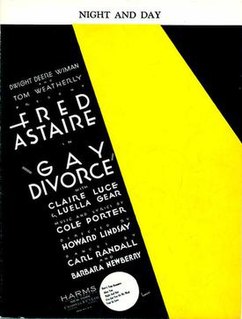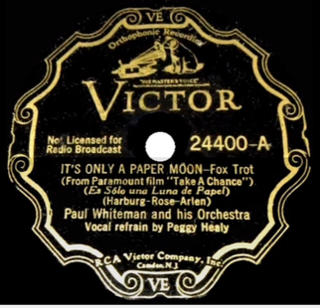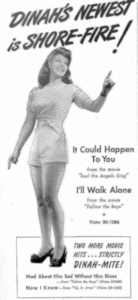Related Research Articles
"Begin the Beguine" is a popular song written by Cole Porter. Porter composed the song between Kalabahi, Indonesia, and Fiji during a 1935 Pacific cruise aboard Cunard's ocean liner Franconia. In October 1935, it was introduced by June Knight in the Broadway musical Jubilee, produced at the Imperial Theatre in New York City. Beguine is a dance and music form, similar to a slow rumba.

"Night and Day" is a popular song by Cole Porter that was written for the 1932 musical Gay Divorce. It is perhaps Porter's most popular contribution to the Great American Songbook and has been recorded by dozens of musicians.
"In the Cool, Cool, Cool of the Evening" is a popular song with music by Hoagy Carmichael and lyrics by Johnny Mercer. It was originally planned to feature it in a Paramount film written for Betty Hutton that never took off, which was to be called The Mack Sennett Girl. The song was buried in Paramount's files until it was rediscovered and then used in the 1951 film Here Comes the Groom and won the Academy Award for Best Original Song.
"They Can't Take That Away from Me" is a 1937 popular song with music by George Gershwin and lyrics by Ira Gershwin. It was introduced by Fred Astaire in the 1937 film Shall We Dance and gained huge success.

"Cheek to Cheek" is a song written by Irving Berlin in 1934–35, specifically for the star of his new musical, Fred Astaire. The movie was Top Hat, co-starring Ginger Rogers. In the movie, Astaire sings the song to Rogers as they dance. The song was nominated for the Best Song Oscar for 1936, which it lost to "Lullaby of Broadway". The song spent five weeks at #1 on Your Hit Parade and was named the #1 song of 1935. Astaire's 1935 recording with the Leo Reisman Orchestra was inducted into the Grammy Hall of Fame in 2000. In 2004, Astaire's version finished at No. 15 on AFI's 100 Years...100 Songs survey of top tunes in American cinema.

"The Way You Look To-night" is a song from the film Swing Time that was performed by Fred Astaire and composed by Jerome Kern with lyrics written by Dorothy Fields. It won the Academy Award for Best Original Song in 1936. Fields remarked, "The first time Jerry played that melody for me I went out and started to cry. The release absolutely killed me. I couldn't stop, it was so beautiful."
"A Gal in Calico" is a song by American composer Arthur Schwartz, whose words were written by Leo Robin.

"A Fine Romance" is a popular song composed by Jerome Kern with lyrics by Dorothy Fields, published in 1936.

"It's Only a Paper Moon" is a popular song published in 1933 with music by Harold Arlen and lyrics by Yip Harburg and Billy Rose.
"Dancing in the Dark" is a popular American song, with music by Arthur Schwartz and lyrics by Howard Dietz, that was first introduced by John Barker with Tilly Losch dancing in the 1931 revue The Band Wagon. The song was first recorded by Bing Crosby on August 19, 1931 with Studio Orchestra directed by Victor Young, staying on the pop charts for six weeks, peaking at #3, and helping to make it a lasting standard.
The 1941 recording by Artie Shaw and His Orchestra earned Shaw one of his eight gold records at the height of the Big Band era of the 1930s and 1940s.
"Don't Take Your Love from Me" is a popular song written by Henry Nemo and published in 1941. Mildred Bailey first recorded this song in 1940 before publication. It was introduced that year by singer Joan Brooks.
"Nice Work If You Can Get It" is a popular song and jazz standard composed by George Gershwin with lyrics by Ira Gershwin.
"I Had the Craziest Dream" is a popular song which was published in 1942. The music was written by Harry Warren, the lyrics by Mack Gordon.

"I'll Walk Alone" is a 1944 popular song with music by Jule Styne and lyrics by Sammy Cahn. The song was written for the 1944 musical film Follow the Boys, in which it was sung by Dinah Shore, and was nominated for the Academy Award for Best Original Song but lost to “Swinging on a Star”. Shore recorded the song in March as a single, which became her first #1 hit on the Billboard charts.
"Let's Call the Whole Thing Off" is a song written by George Gershwin and Ira Gershwin for the 1937 film Shall We Dance, where it was introduced by Fred Astaire and Ginger Rogers as part of a celebrated dance duet on roller skates. The sheet music has the tempo marking of "Brightly". The song was ranked No. 34 on AFI's 100 Years...100 Songs.
"They All Laughed" is a song composed by George Gershwin, with lyrics by Ira Gershwin, written for the 1937 film Shall We Dance where it was introduced by Ginger Rogers as part of a song and dance routine with Fred Astaire.
"A Foggy Day" is a popular song composed by George Gershwin, with lyrics by Ira Gershwin. The song was introduced by Fred Astaire in the 1937 film A Damsel in Distress. It was originally titled "A Foggy Day " in reference to the pollution-induced pea soup fogs that were common in London during that period, and is often still referred to by the full title.
The commercial recording by Astaire for Brunswick was very popular in 1937.
"(I've Got) Beginner's Luck" is a song composed by George Gershwin, with lyrics by Ira Gershwin, written for the 1937 film Shall We Dance, it was introduced by Fred Astaire. It's a brief comic tap solo with cane where Astaire's rehearsing to a record of the number is cut short when the record gets stuck. Astaire's commercial recording for Brunswick was very popular in 1937.
"All or Nothing at All" is a song composed in 1939 by Arthur Altman, with lyrics by Jack Lawrence.
"Don't Worry 'bout Me" is a 1938 song composed by Rube Bloom, with lyrics written by Ted Koehler. It was introduced in the "World's Fair" edition of the Cotton Club show in 1939. The first hit recording was in 1939 by Hal Kemp and His Orchestra.
References
- ↑ Library of Congress. Copyright Office. (1938). Catalog of Copyright Entries 1938 Musical Compositions New Series Vol 33 Pt3 For the Year 1938. United States Copyright Office. U.S. Govt. Print. Off.
- ↑ "BRUNSWICK 78rpm numerical listing discography: 8000 - end of series (8517)". www.78discography.com. Retrieved 2021-08-04.
- ↑ Fred Astaire With Ray Noble And His Orchestra – Change Partners / I Used To Be Color Blind (1937, Shellac) , retrieved 2021-08-04
- ↑ Whitburn, Joel (1986). Joel Whitburn's Pop Memories 1890–1954 . Wisconsin, USA: Record Research Inc. p. 484. ISBN 0-89820-083-0.
- ↑ "secondhandsongs.com". secondhandsongs.com. Retrieved June 8, 2020.
- ↑ "allmusic.com". allmusic.com. Retrieved May 12, 2017.